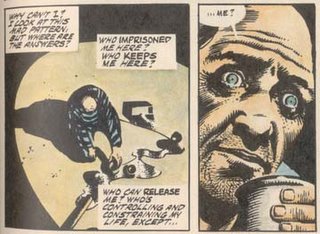
While the circus was spinning and we were hearing about bird flu, and rootkits in CDs, and IBM's global identity system, and generally having an apoplectic fit over the Orwellian wonder of it all ... Congress has been busy, quietly preparing the final nail in the coffin of liberty and getting ready to reauthorize the USAPATRIOT (Uniting and Strengthening America by Providing Appropriate Tools Required to Intercept and Obstruct Terrorism) Act, an abomination that has neither united nor strengthened America.
Proving once again B.W.'s Theorem No. 1: When all hell breaks loose and we're all distracted, check to see what Congress is doing, because it won't be good.
Senator Feingold, no friend of the First Amendment, is at least keeping us informed about the lack of progress toward disarming USAPATRIOT's arsenal against liberty:
Washington, D.C. – U.S. Senator Russ Feingold today released the following statement on the Patriot Act conference report, scheduled to come to the Senate floor as early as this week.
“Reports out of the PATRIOT Act reauthorization conference committee are extremely troubling. In July, members on both sides of the aisle in the Senate unanimously agreed that changes needed to be made to the PATRIOT Act and passed a bill that took important steps to protect Americans’ rights and freedoms. Unfortunately, it appears that the conference committee is likely to reject that bipartisan consensus.
"In 2001, I was alone in the Senate in opposing the Patriot Act. But for the past several years, a bipartisan coalition has been working together to seek modifications. I agreed to support the Senate version of the reauthorization bill even though it did not go nearly as far as the SAFE Act. I cannot stand by while the conference committee undermines the modest protections for our rights and freedoms contained in the Senate bill. The American people deserve better.
"Working with my colleagues, I will consider all procedural options at my disposal to fight a final reauthorization bill that doesn’t fix the Patriot Act.”
In a fact sheet he released in late October, Feingold listed four reasons why the Senate version of the reauthorization is an improvement over the House version:
Reason 1 – The Senate version protects against overly intrusive searches of library, bookstore, medical and other personal records.
The Senate version of the bill requires that the government demonstrate to a court that the library, bookstore, medical or other personal records it seeks under Section 215 of the PATRIOT Act are connected to a suspected terrorist or spy, and it provides the right to challenge a Section 215 order in court."Despite repeated assurances from the Administration that Section 215 has not been used to obtain library records, we know from an American Library Association study that federal, state and local investigators have obtained library records nearly 200 times since 2001," Feingold said. "Meaningful judicial oversight of Section 215 is imperative to protect the privacy of law-abiding Americans."Reason 2 – The Senate version helps protect the privacy of Americans subject to secret searches.
The Senate version of the bill requires the government in most circumstances to notify targets of secret "sneak and peek" search warrants within seven days of government agents searching their homes or offices. The House version would allow the government to wait six months."The Bill of Rights guarantees every American the right to be free from unreasonable searches and seizures," Feingold said. "Notification of a search is a crucial part of the constitutional guarantee because it allows the reasonableness of and authority for the search to be challenged. Nearly permanent secrecy should always be the exception, not the rule."Reason 3 – The Senate version requires the Justice Department to provide more information to Congress on its use of the PATRIOT Act.
The Senate version of the bill requires that the Justice Department report to Congress, including the Senate Judiciary Committee, on its use of a variety of controversial PATRIOT Act surveillance powers, including its reliance on Section 215 orders specifically to obtain library, bookstore, firearm sales, medical or tax records, and the government's use of secret "roving" intelligence wiretaps."The Administration's continued attempts to dodge congressional oversight are a disservice to our constitutional system of checks and balance," Feingold said. "The extraordinary surveillance powers of the Patriot Act must always be subject to strict congressional scrutiny so that the American people can be confident that the government is not going too far."Reason 4 – The Senate version includes a four-year sunset for some of the Act’s most controversial domestic surveillance powers.
The Senate version of the bill mandates that Congress revisit in four years the PATRIOT Act's most controversial sections, including Section 215, the so-called "library records" provision. The House version would not sunset any provisions until 2015."While the Senate version of the PATRIOT Act's reauthorization isn't perfect, it recognizes the continued potential danger of some of the most controversial provisions," Feingold said. "Congress should impose another four-year sunset on those provisions to guarantee an earlier opportunity to re-evaluate the government's need for and use of these
powers."The damned law needs to be repealed, but in our growing totalitarian environment, the Senate's timid scratchings at the edges of USAPATRIOT are better than nothing. While it seems ironic that the co-author of the McCain-Feingold First Amendment Repeal Act would defend the Fourth, Fifth, Sixth and other amendments, at least someone is trying to raise the alarm .
The fact is while we all chase after the Oz-like nuttiness of Sony, IBM and miscellaneous fruitcake politicians, the Men Behind The Curtain are quietly working to etch their Bill of Rights Repeal into stone. Someday soon the mainstream media will wake up and let us know the terrorists have won and USAPATRIOT is revitalized.
















